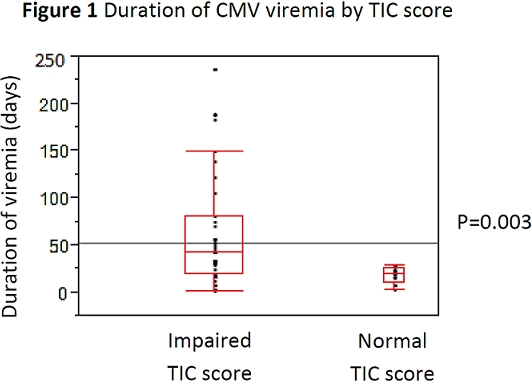CMV-Specific CD8+ T-Cell Immune Competence Score as Predictor of Outcome for CMV Infection after Transplantation
1Division of Infectious Diseases, Mayo Clinic, Rochester, MN
2Laboratory Medicine and Pathology, Mayo Clinic, Rochester, MN.
Meeting: 2018 American Transplant Congress
Abstract number: C315
Keywords: Cytomeglovirus, Infection
Session Information
Session Name: Poster Session C: Transplant Infectious Diseases
Session Type: Poster Session
Date: Monday, June 4, 2018
Session Time: 6:00pm-7:00pm
 Presentation Time: 6:00pm-7:00pm
Presentation Time: 6:00pm-7:00pm
Location: Hall 4EF
Introduction: Control of cytomegalovirus (CMV) infection after solid organ transplantation (SOT) requires a functional immune system. We assessed the utility of a flow cytometric assay quantifying CMV-specific CD8+ T cells in predicting the outcome of CMV infection and disease after SOT.
Methods: During 2007-2017, selected kidney, heart, lung, pancreas, liver and composite tissue transplant patients with CMV infection and disease were tested for CMV-specific CD8+ T cell immune competence, as measured by quantitating the number of CMV-CD8+ T cells using MHC class I tetramers with CMV-specific peptides, and assessing their function by antigen-specific interferon-gamma (IFNg) production and CD107a/b degranulation. As a positive control for global CD8+ T cell immune function, IFNg production and CD107 degranulation in response to mitogenic stimulus (PMA and ionomycin) was measured. The quantitative and functional data was used to assemble a T cell immune competence score (TIC). CMV infection was diagnosed by quantitative PCR in blood and other samples, or histopathology. The TIC score and measures of global immune function were correlated with CMV outcomes.
Results: Of the 130 SOT patients tested, 72 had active CMV infection or disease. Gender distribution was equal. The median age was 57.5 years (IQR: 47.8-64). The median onset to CMV infection and disease was 11.9 months (IQR 7.32-21.63). CMV syndrome (45%), gastrointestinal disease (24%) and pneumonia (17%) were most common clinical presentation. Impaired TIC score or global CD8+ T cell function was associated with invasive CMV disease (OR 5.2, p=0.03). Patients with normal TIC score had shorter duration of CMV viremia (20.7 vs. 33.5 days, p=0.003) (Figure 1). Patients with normal global CD8+ T cell immune function had lower risk of CMV relapse (22.6 vs. 52.9%, p=0.02).
Conclusion: CMV-specific and global CD8+ T cell immune function is associated with clinical course of CMV infection and disease after solid organ transplantation, and has the potential to assist in its clinical management.
CITATION INFORMATION: Meesing A., Abraham R., Razonable R. CMV-Specific CD8+ T-Cell Immune Competence Score as Predictor of Outcome for CMV Infection after Transplantation Am J Transplant. 2017;17 (suppl 3).
To cite this abstract in AMA style:
Meesing A, Abraham R, Razonable R. CMV-Specific CD8+ T-Cell Immune Competence Score as Predictor of Outcome for CMV Infection after Transplantation [abstract]. https://atcmeetingabstracts.com/abstract/cmv-specific-cd8-t-cell-immune-competence-score-as-predictor-of-outcome-for-cmv-infection-after-transplantation/. Accessed February 25, 2026.« Back to 2018 American Transplant Congress

